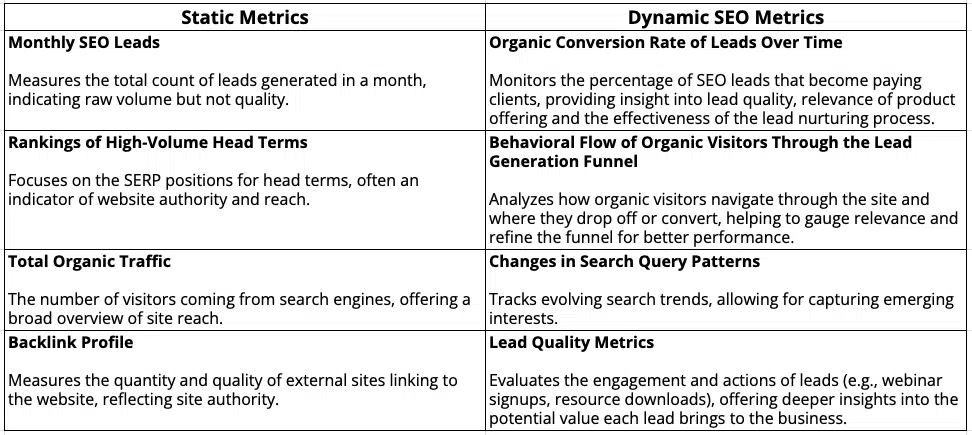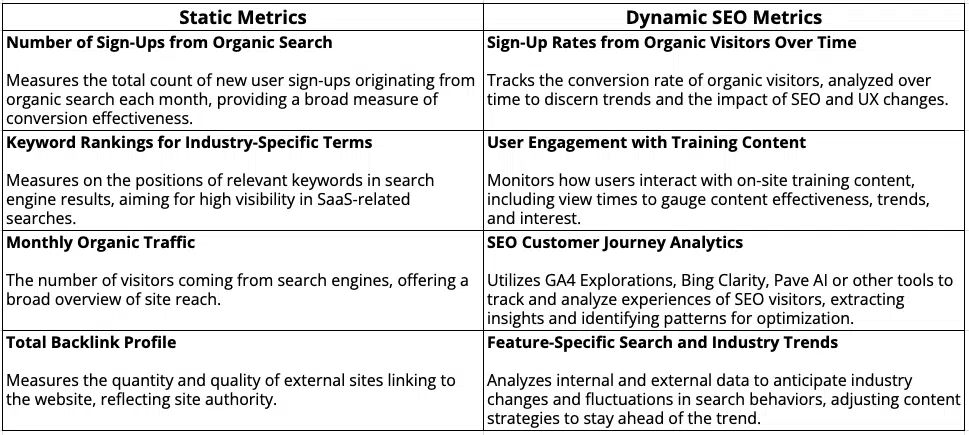SEO KPIs: Embracing user-centric metrics
Go beyond static SEO metrics. Integrate dynamic, user-centric KPIs to gain meaningful insights into evolving user behaviors and search trends.
The traditional approach to SEO KPIs often falls short of capturing the dynamic nature of user interactions and search patterns.
This article proposes a paradigm shift: integrating dynamic, user-centric metrics into established SEO KPI frameworks.
By doing so, we can go beyond static measurements like organic traffic volume and keyword rankings and tap into behavioral insights that reflect the fluidity of user needs and search trends. Ultimately, this redefines how we measure and interpret SEO success.
From static benchmarks to dynamic insights
Google’s Search Quality Rater Guidelines mention the word “user” more than 800 times across 168 pages, including an entire section called “Understanding Search User Needs.”
But despite being important to Google and critical for success in SEO, user-centric SEO metrics are rarely used to support SEO KPIs and goals.
Dynamic user-centric metrics capture behavioral signals that change continuously, reflecting the ongoing interaction between users and a website. These metrics support adaptive KPI frameworks.
They are especially beneficial for agile teams and small players who can quickly adapt and pivot. By acting on new information and insights, you can gain a competitive SEO advantage in domains filled with established sites.
By incorporating metrics prioritizing user experience and engagement, you can ensure your content stays relevant and high-quality. This is important for users and Google, as it helps maintain focus on meeting user intent effectively.
Traditional vs. dynamic SEO metrics
Dynamic metrics offer a more nuanced and timely understanding of SEO performance, complementing the static benchmarks:
Implementing dynamic SEO metrics in diverse contexts
Expanding existing SEO KPI frameworks to include dynamic, user-centric metrics can help create a more holistic view of overall SEO performance and existing opportunities.
Below are examples of how customer-centricity can support and enrich SEO KPIs.
Publisher sites
For publisher sites, where content is king and audience engagement is paramount, dynamic user-centric metrics can effectively track and enhance content performance, reader engagement, and overall site visibility.

Dig deeper: How to determine the SEO metrics that matter
Ecommerce sites
In ecommerce, where driving sales and product discovery are critical, dynamic metrics can significantly enhance the understanding of customer behavior, product visibility, and conversion effectiveness.

Dig deeper: 5 outdated marketing KPIs to toss and what to reference instead
Lead generation sites
For lead generation sites, where the focus is on converting visitors into leads, dynamic metrics can go a long way in understanding visitor behavior, improving lead quality, and optimizing the overall lead generation process.

Dig deeper: 4 smarter ways to measure SEO effectiveness
SaaS Sites
In the SaaS sector, where user engagement and software adoption are key, dynamic metrics offer deeper insights into user behavior, product interest, and customer journey, which are crucial for tailoring strategies in the fast-evolving SaaS market.

Dig deeper: 10 SEO challenges faced by fast-growing SaaS companies
Rethinking SEO metrics through a user-centric lens
When you incorporate user-focused data into your SEO metrics, you can enhance your approach to SEO.
Pay more attention to what users do and what they search for.
By prioritizing the user, you’ll gain deeper insights, adapt faster, and create strategies that resonate better with your audience.
Opinions expressed in this article are those of the guest author and not necessarily Search Engine Land. Staff authors are listed here.
Related stories
New on Search Engine Land


